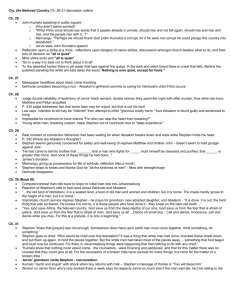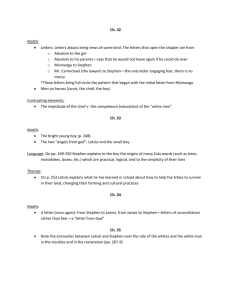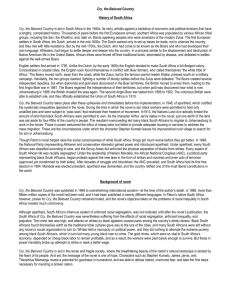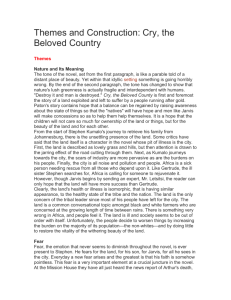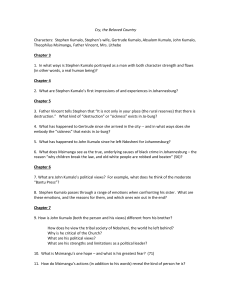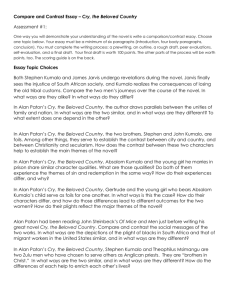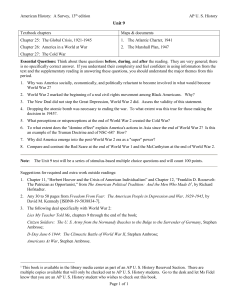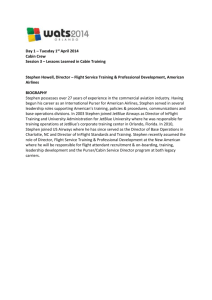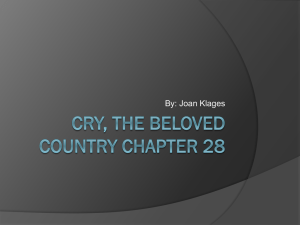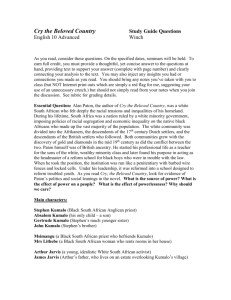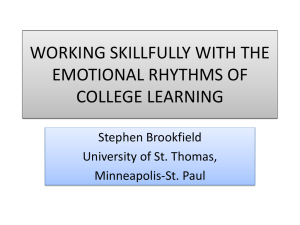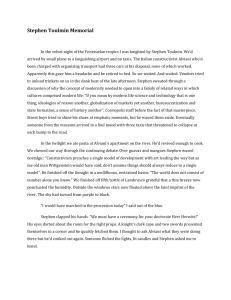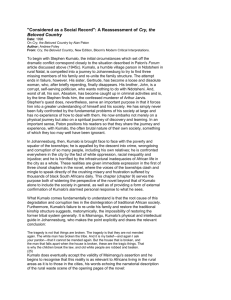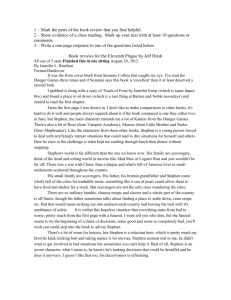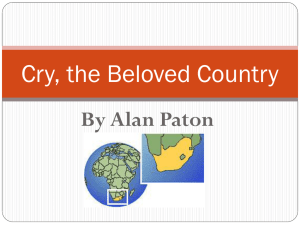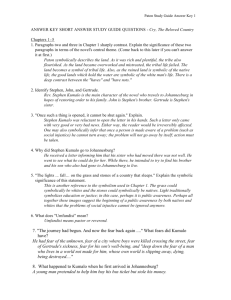Cry, the Beloved Country Discussion Questions: Book I 1. The
advertisement
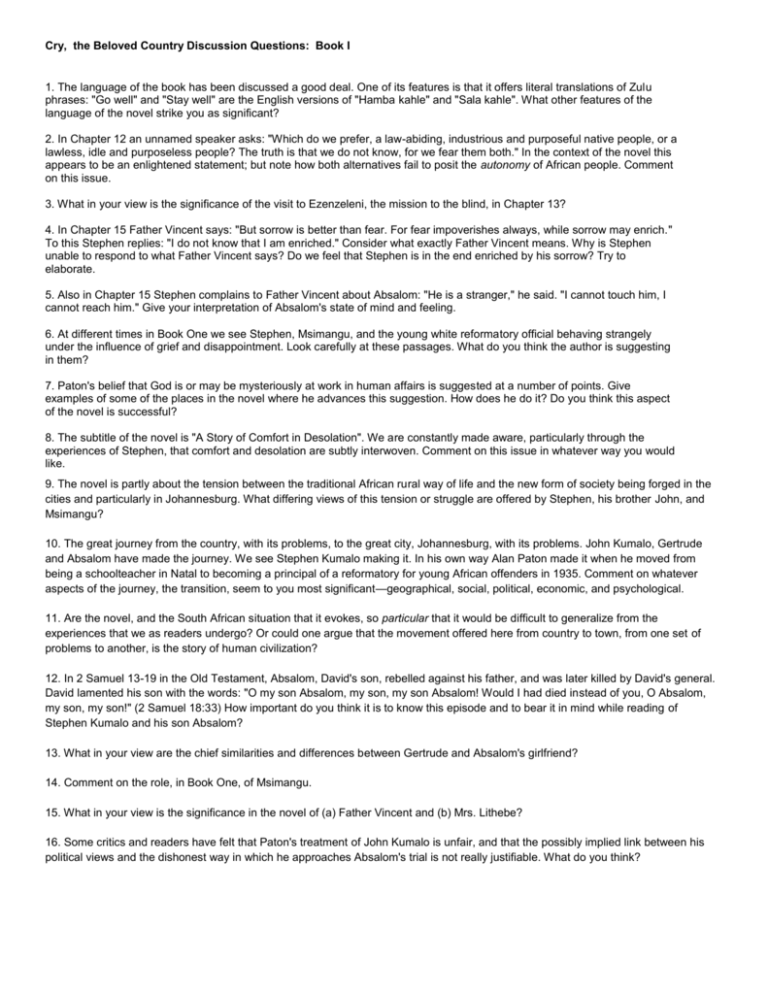
Cry, the Beloved Country Discussion Questions: Book I 1. The language of the book has been discussed a good deal. One of its features is that it offers literal translations of Zulu phrases: "Go well" and "Stay well" are the English versions of "Hamba kahle" and "Sala kahle". What other features of the language of the novel strike you as significant? 2. In Chapter 12 an unnamed speaker asks: "Which do we prefer, a law-abiding, industrious and purposeful native people, or a lawless, idle and purposeless people? The truth is that we do not know, for we fear them both." In the context of the novel this appears to be an enlightened statement; but note how both alternatives fail to posit the autonomy of African people. Comment on this issue. 3. What in your view is the significance of the visit to Ezenzeleni, the mission to the blind, in Chapter 13? 4. In Chapter 15 Father Vincent says: "But sorrow is better than fear. For fear impoverishes always, while sorrow may enrich." To this Stephen replies: "I do not know that I am enriched." Consider what exactly Father Vincent means. Why is Stephen unable to respond to what Father Vincent says? Do we feel that Stephen is in the end enriched by his sorrow? Try to elaborate. 5. Also in Chapter 15 Stephen complains to Father Vincent about Absalom: "He is a stranger," he said. "I cannot touch him, I cannot reach him." Give your interpretation of Absalom's state of mind and feeling. 6. At different times in Book One we see Stephen, Msimangu, and the young white reformatory official behaving strangely under the influence of grief and disappointment. Look carefully at these passages. What do you think the author is suggesting in them? 7. Paton's belief that God is or may be mysteriously at work in human affairs is suggested at a number of points. Give examples of some of the places in the novel where he advances this suggestion. How does he do it? Do you think this aspect of the novel is successful? 8. The subtitle of the novel is "A Story of Comfort in Desolation". We are constantly made aware, particularly through the experiences of Stephen, that comfort and desolation are subtly interwoven. Comment on this issue in whatever way you would like. 9. The novel is partly about the tension between the traditional African rural way of life and the new form of society being forged in the cities and particularly in Johannesburg. What differing views of this tension or struggle are offered by Stephen, his brother John, and Msimangu? 10. The great journey from the country, with its problems, to the great city, Johannesburg, with its problems. John Kumalo, Gertrude and Absalom have made the journey. We see Stephen Kumalo making it. In his own way Alan Paton made it when he moved from being a schoolteacher in Natal to becoming a principal of a reformatory for young African offenders in 1935. Comment on whatever aspects of the journey, the transition, seem to you most significant—geographical, social, political, economic, and psychological. 11. Are the novel, and the South African situation that it evokes, so particular that it would be difficult to generalize from the experiences that we as readers undergo? Or could one argue that the movement offered here from country to town, from one set of problems to another, is the story of human civilization? 12. In 2 Samuel 13-19 in the Old Testament, Absalom, David's son, rebelled against his father, and was later killed by David's general. David lamented his son with the words: "O my son Absalom, my son, my son Absalom! Would I had died instead of you, O Absalom, my son, my son!" (2 Samuel 18:33) How important do you think it is to know this episode and to bear it in mind while reading of Stephen Kumalo and his son Absalom? 13. What in your view are the chief similarities and differences between Gertrude and Absalom's girlfriend? 14. Comment on the role, in Book One, of Msimangu. 15. What in your view is the significance in the novel of (a) Father Vincent and (b) Mrs. Lithebe? 16. Some critics and readers have felt that Paton's treatment of John Kumalo is unfair, and that the possibly implied link between his political views and the dishonest way in which he approaches Absalom's trial is not really justifiable. What do you think? Cry, the Beloved Country Discussion Questions: Book II 1. What in your view is the effect produced by the repetition of the opening paragraph of the novel at the beginning of Book Two? 2. Describe the salient differences between Stephen Kumalo's home, as pictured in Book One, Chapter 2, and James Jarvis's home, as pictured in Book Two, Chapter 18. 3. In Book Two, we see James Jarvis going on a mental, moral and emotional journey. What are the main lessons that he learns? 4. In what ways is James Jarvis like Stephen Kumalo, and in what ways is he unlike him? 5. Comment on what we see of James Jarvis's wife Margaret and of Stephen Kumalo's wife. Are they in any ways similar? 6. "Kumalo and Jarvis had both failed to get to know their sons. By the time they do know them, it is too late." Is this a fair comment on (a) Stephen and (b) Jarvis? 7. Give a sketch of the political and economic views of Harrison (Chapter 21) and of those who speak for the mines (Chapter 23). What are Paton's stated or implied criticisms of these views? 8. Study Chapter 21. How much do we learn of Arthur Jarvis from what his father sees and finds in his study? 9. What are the main features of Arthur Jarvis's views, as they are expressed in the passages of his writings that his father reads (Chapters 20, 21 and 24)? 10. Study Chapter 25, which presents the unplanned meeting of Stephen and Jarvis. Look carefully at and comment on the emotions of both men. 11. Try to define the relationship between, on the one hand, the main story of two fathers and two sons and, on the other hand, the various political events that are described and discussed in the course of the novel. 12. At the end of Chapter 26 we read: "In the deserted harbor there is yet water that laps against the quays. In the dark and silent forest there is a leaf that falls. Behind the polished paneling the white ant eats away the wood. Nothing is ever quiet, except for fools." Comment on this in the light of the novel as a whole. 13. Consider Gertrude. In your view, was her sudden desire to become a nun (Chapter 27) genuine, or a deliberate subterfuge, or something between these two extremes? How is all this related to her disappearance at the end of Chapter 29? 14. Attempt to offer your judgment of the judge's judgment in Chapter 28. 15. How in your view do we react to Msimangu's decision, in Chapter 29, to retire into a community and "forswear forever the world and its possessions"? Cry, The Beloved Country Discussion Questions: Book III 1. Again and again we see Stephen Kumalo experiencing a balance of suffering and joy, of "desolation" and "comfort." What are his chief sources of pain and pleasure as he returns to Ndotsheni in Chapter 30? 2. How in your view, do the drought and the storm which breaks the drought, fit into the pattern of the main story? 3. Examine in detail Stephen's visits to the chief and the headmaster in Chapter 31. 4. What do you see as the significance of the bright young boy, Arthur's son, who appears in Chapters 31 and 33? 5. Isn't it odd that in Chapter 32, Jarvis and the others should mark out the space for the new dam without informing Stephen of their intentions? Are we perhaps to take this as an instance of the unwitting high-handedness of well-meaning liberals? And is the unannounced arrival of Napoleon Letsisi in Chapter 33 another result of this attitude? 6. Letsisi offers hope that the soil-eroded valley of Ndotsheni can be restored. Paton has been taken to task by some critics for suggesting that reviving the eroded countryside of South Africa could solve the country's great problems. Do you think this is a fair criticism? (See also question 15.) 7. In Chapter 34 Stephen feels certain that the letter from Jarvis—which arrives at a crucial moment while he is with the Bishop—is an instance of divine intervention. Does Paton, in your view, succeed in telling the story in such a way that we are able to sympathize with and even share Stephen's view? 8. What are our impressions of the Bishop, who appears in Chapter 34? 9. Attempt to sum up the varied feelings of the Ndotsheni community as Letsisi's new agricultural theories and plans begin to be put into action. 10. The discussion between Stephen Kumalo and Napoleon Letsisi in the second half of Chapter 35 is extremely important. In it Paton introduces a challenging critique of Stephen's assumptions. In what ways, if any, does this discussion alter our assessment of Stephen and his vision of human life? 11. More specifically, do Letsisi's sound views of self-reliance and socio-political awareness undermine the religious vision, which the novel has seemed to embody? 12. Study carefully the meeting between Stephen and Jarvis in Chapter 36. What do we learn about the two men, and about the nature of their relationship? 13. Write an evaluation of Stephen's night vigil on the mountain. What does it achieve for him? What does it achieve for the reader? 14. Write an account of your detailed responses to the final paragraph of the novel. 15. One of the fascinating and significant aspects of Cry, the Beloved Country is that it tells a particular fictional story and is at the same time, to some degree, a book about South Africa in 1946 and its possible or probable future. This has meant that what could be interpreted as Paton's ways of resolving the particular issues that have arisen within the fictional story have been assumed by some—rightly or wrongly—to represent his blueprint for the future of South Africa. Write a comment on this issue.
